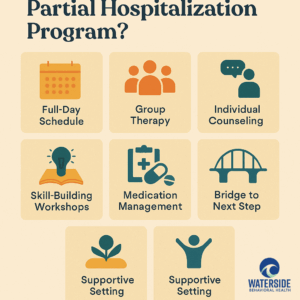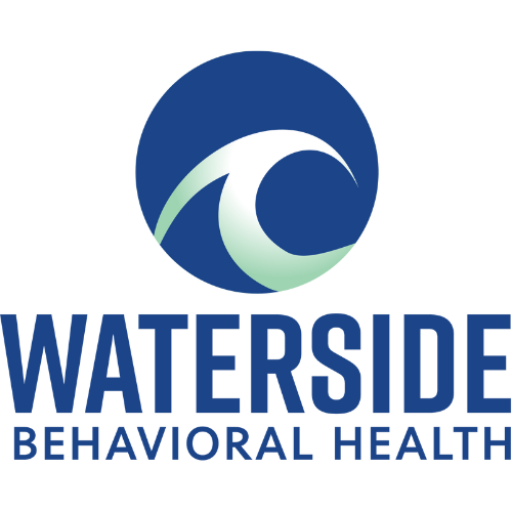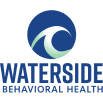Even if you’re proud of being sober, it can feel like you’re watching everyone else live in a world you can’t step into. Friends are making weekend plans that involve shots and dance floors, and you’re home wondering if you’re the only 20-something in Massachusetts whose idea of “Friday night” now involves herbal tea.
That weird, in-between space—where you’re not using anymore but haven’t figured out what your new “normal” looks like—is exactly where a Partial Hospitalization Program (PHP) can help. It’s a structured, supportive place to get your footing without feeling like you’ve been thrown into a hospital ward or left to figure it out alone.
At Waterside Behavioral Health’s PHP in Massachusetts, here’s what you can expect—not from a brochure, but from the perspective of someone who knows how weird and overwhelming this stage can feel.
1. A Full-Day Schedule That’s About You
A PHP usually runs five to six hours a day, Monday through Friday. That’s long enough to give you structure, but short enough that you still get to go home at night.
Mornings might start with a group check-in—yes, it’s a circle of chairs, but it’s not all “tell us your deepest secret” from day one. You might talk about how you’re feeling, what’s on your mind, or what’s been tough lately.
The rest of the day is a mix of group therapy, one-on-one counseling, and skill-building workshops. Think:
- Learning ways to handle anxiety when it pops up out of nowhere
- Figuring out how to have honest conversations with friends without feeling like you’re preaching
- Understanding what triggers your cravings (and what to do about it)
It’s a rhythm you can count on—which helps when your personal life feels like it’s been hit by a reset button.
2. Groups That Don’t Feel Like Group Projects
If you hear “group therapy” and think of high school group projects where one person does all the work—this is different.
A good PHP group is more like a team huddle. Everyone’s there for a reason, and the facilitator (usually a licensed therapist) knows how to keep the conversation real. You’ll be with people who might be working on substance use recovery, mental health challenges, or both. That mix is actually refreshing—sometimes you learn the most from someone whose story is nothing like yours.
And if you’re worried about having to speak up right away, don’t. Many people sit back at first. You get to ease in at your own pace.
3. One-on-One Support That Goes Deeper
PHP isn’t just about group time—you’ll also have individual therapy sessions. This is where you can talk about things you might not want to share in a group, like:
- Family pressure
- Fears about dating sober
- Feeling like you’ve lost part of your identity
Your therapist is there to help you sort through the messy, private stuff. They’re not here to tell you who to be. They’re here to help you figure out who you want to be now.
4. Practical Skills You Can Use Outside the Bubble
One of the most valuable parts of PHP is the “take it with you” factor. You’re not just learning coping skills for the therapy room—you’re testing them in real life as soon as you leave for the day.
For example:
- You might role-play turning down a drink at a party, then try it for real that weekend.
- You might learn a breathing technique for anxiety, then use it before a big class presentation.
That’s the beauty of PHP over inpatient care—you get to practice in real time, not months later.

5. Access to Psychiatry and Medication Management
If you’re dealing with anxiety, depression, ADHD, or another mental health condition alongside your recovery, PHP offers psychiatric care. This means you can:
- Have a medication plan created just for you
- Check in regularly to see if it’s working
- Adjust it without waiting months for an appointment
And no—it’s not about changing your personality or making you “less you.” It’s about giving your brain what it needs to function so you can focus on living your life, not just surviving it.
6. A Bridge to the Next Step
PHP isn’t a forever thing. Most people stay anywhere from two to six weeks, depending on their needs. The goal is to get you stable, confident, and ready for the next level of care—like an intensive outpatient program in Plymouth County, MA.
When you leave, you’ll have:
- A personalized aftercare plan
- Connections to local support groups or community resources
- A clear idea of what’s next—so you’re not just left wondering
7. A Space Where You’re Not the “Weird One”
Here’s the thing: in PHP, being sober isn’t the exception—it’s the norm. Nobody looks at you sideways for skipping drinks. Nobody treats you like you’re fragile glass.
In fact, you might find that for the first time in a while, you’re surrounded by people who understand that “being okay” can take work—and who aren’t afraid to talk about it.
“I thought I was the only one my age doing this. Turns out, I wasn’t. And that made all the difference.” – PHP Client, 2024
FAQ: Partial Hospitalization Programs in Massachusetts
1. How is a PHP different from inpatient rehab?
Inpatient rehab means you live at the facility 24/7. PHP lets you go home at night, so you can keep some independence while still getting intensive support.
2. Can I work or go to school while in PHP?
It depends on your schedule. PHP is a daytime commitment, so you might need to take time off or adjust classes/work. Many people see it as an investment in making everything else more manageable long-term.
3. Do I have to talk in group therapy?
Not right away. You can ease in and participate when you feel ready. Most people find it less intimidating after the first week.
4. Will insurance cover a PHP?
Many insurance plans do cover partial hospitalization. Our admissions team can help you figure out your coverage before you start.
5. What happens after PHP?
Most people step down to an intensive outpatient program or traditional outpatient therapy. You and your treatment team will decide what’s best for you.
Feeling less like the ‘weird one’ starts with being around people who get it—and who want to see you succeed.
Call 774-619-7750 or visit our Partial Hospitalization Program page to learn more about our services in Plymouth County, MA.




